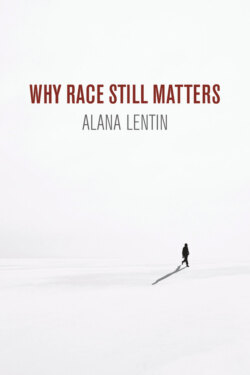Why Race Still Matters

Реклама. ООО «ЛитРес», ИНН: 7719571260.
Оглавление
Alana Lentin. Why Race Still Matters
Contents
Guide
Pages
WHY RACE STILL MATTERS
Copyright page
Acknowledgements
Introduction
1 Race beyond Social Construction
Eugenics redux
Race: the social construction of what?
Beyond culture versus biology
Epigenetic potential?
The conditions of invention
Notes
2 ‘Not Racism™’
Historicizing ‘not racism’
The Eurocentrism of racism
Race and taboo
The limits of comparison
‘Mission creep’
Notes
3 Making It about Race
Smugs versus ordinaries
Lost honour
Misplacing identity
Pessimism or survival?
The problems of seeing the world from where you stand
Notes
4 Good Jew/Bad Jew
The co-dependency of antisemitism and Islamophobia
Weapon or double-edged sword?
Decolonizing antisemitism
Notes
Conclusion: Talking and Not Talking about Race
Notes
References
Index
POLITY END USER LICENSE AGREEMENT
Отрывок из книги
Alana Lentin
There are many people who helped directly and indirectly in the writing of this book. Some of them I have never met. So, although it may seem strange to do so, I want to start by thanking my fellow antiracist scrollers and 280-character formulators on Twitter. Twitter at times is enraging and it is certainly also a drain on my time. But it is undeniable that, were it not for Twitter, this book would not have taken shape in quite the way it has, especially because sometimes I find living in Australia to be an isolating experience. Twitter helps me feel closer to an international community of race scholars. Knowing what I was writing on, Twitter friends sent me countless examples of the ‘not racism’ I explore in Chapter 2. I want to thank Michael Richmond in particular, who, as well as publishing an article I wrote on ‘Frozen Racism’ in the Occupied Times, contributed many examples and much food for thought.
.....
Despite this, for many it is dangerous to speak about race and better to talk about racism as a set of practices produced by the ‘ideology’, or what has been referred to as the ‘folk idea’, of race (Fields et al. 2015; Haider 2018a). However, race is not ‘stuck’ in the nineteenth century, and, as I discuss in greater detail in Chapter 2, it did not ‘end’ with the Holocaust, Apartheid, or Jim Crow. I disagree that it is sufficient or possible to talk about racism without explaining the genealogy of race as a system of rule and revealing this process of continual reproduction. I believe that racism is better understood as beliefs, attitudes, ideas, and morals that build on understandings of the world as racially delineated. I explore the evolution of racism, only coined at the end of the nineteenth century, in order to make sense of intra-European racial divisions, predominantly antisemitism, in Chapter 2. My point here it that we need to work with both concepts – race and racism – because they are reliant on each other. I prefer to label my approach to scholarship ‘race critical’, rather than the more common ‘critical race’, in recognition of the fact that while we can and should use race analytically, we should also question its terms.
Preferencing racism over race runs a certain risk because, outside of scholarly and activist conversations, racism is used in a very particular way in the public domain to confer a moral judgement. It is now universally understood that to be racist is to have erred morally, as an individual. This is why, as Sara Ahmed has shown (Ahmed 2012), the primary response to accusations of racism is horror and outrage: how dare you call me a racist? And as the Aboriginal rapper Adam Briggs said after Australian football players appeared at a party in blackface, ‘People look at me like it’s my problem. Like pointing out racism is worse than the act itself. Saying “that’s racist” creates more drama than the actual blackface situation’ (McCormack 2016).
.....